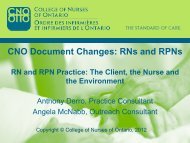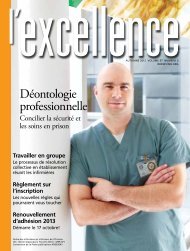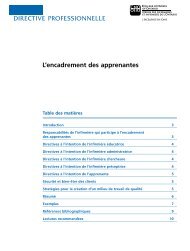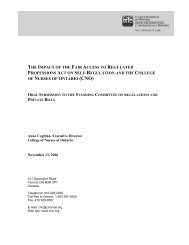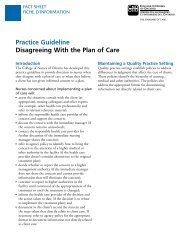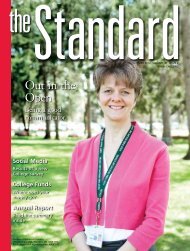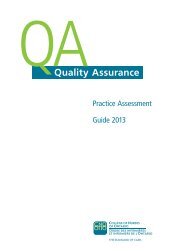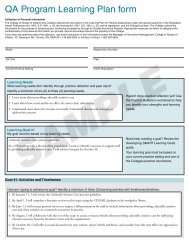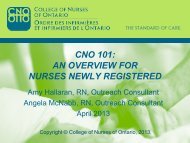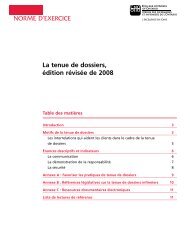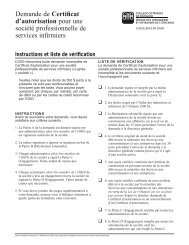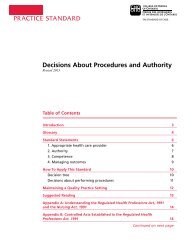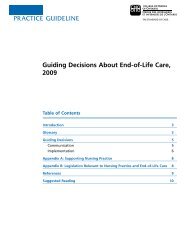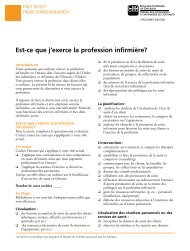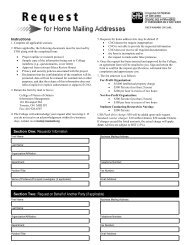Working with Unregulated Care Providers - College of Nurses of ...
Working with Unregulated Care Providers - College of Nurses of ...
Working with Unregulated Care Providers - College of Nurses of ...
Create successful ePaper yourself
Turn your PDF publications into a flip-book with our unique Google optimized e-Paper software.
<strong>Working</strong> <strong>with</strong> <strong>Unregulated</strong> <strong>Care</strong> <strong>Providers</strong><br />
Anthony Derro, Practice Consultant<br />
Ackeisha Hamilton, Practice Liaison<br />
August 28, 2012<br />
Copyright © <strong>College</strong> <strong>of</strong> <strong>Nurses</strong> <strong>of</strong> Ontario, 2012.
Purpose<br />
Assist nurses to understand their roles and<br />
responsibilities when working <strong>with</strong> unregulated care<br />
providers (UCPs)<br />
Note: The slides are an assistive tool for the teleconference. They are not<br />
meant to be used as a stand-alone reference.<br />
2
Learner Objectives<br />
Understand the role <strong>of</strong> the nurse when:<br />
• teaching,<br />
• delegating to,<br />
• assigning duties to, or<br />
• supervising UCPs<br />
Note: we will respond to dial-in questions from participants at the end <strong>of</strong> the<br />
teleconference or you may email us at prp@cnomail.org.<br />
3
New UCP Practice Guideline<br />
• Replaces the previous guidelines <strong>Working</strong> With<br />
<strong>Unregulated</strong> <strong>Care</strong> <strong>Providers</strong> and Utilization <strong>of</strong><br />
<strong>Unregulated</strong> <strong>Care</strong> <strong>Providers</strong> (UCPs)<br />
• Content from the two previous guidelines merged into<br />
one guideline<br />
• Some new content added that did not appear in either<br />
<strong>of</strong> the two previous guidelines<br />
4
Introduction<br />
• The term UCP refers to a paid care provider, family<br />
member or member <strong>of</strong> the household<br />
• UCPs are not accountable to a regulatory body<br />
• UCPs perform a variety <strong>of</strong> tasks based on role or<br />
employment<br />
5
Role <strong>of</strong> the Nurse<br />
A nurse who teaches, delegates to, assigns duties to or<br />
supervises UCPs must:<br />
• know the UCP is competent,<br />
• ensure that the UCP understands their<br />
responsibilities, how to ask for assistance and how to<br />
report outcomes,<br />
• ensure there is an ongoing assessment <strong>of</strong> client<br />
needs<br />
6
<strong>Nurses</strong>’ Accountability<br />
• Taking responsibility for decisions and actions<br />
• Taking action when needed<br />
• Ensuring practice is consistent <strong>with</strong> entry-to-practice<br />
competencies, standards <strong>of</strong> practice, guidelines and<br />
legislation<br />
7
Controlled Acts Procedures<br />
• Administering Ventolin inhalation to clients<br />
• Administering narcotic injection via subcutaneous or<br />
intramuscular route<br />
Non-Controlled Acts Procedures<br />
• Administering medication via a G-tube<br />
• Administering oral narcotics<br />
8
Controlled Acts Exceptions<br />
• Family member (member <strong>of</strong> household), e.g., parents,<br />
spouse, brother/sister, etc.<br />
• Paid care provider, e.g., home care agency workers<br />
9
Routine Activity <strong>of</strong> Living<br />
Is this a routine activity <strong>of</strong> living<br />
• Administering insulin to a client who was recently<br />
diagnosed <strong>with</strong> diabetes<br />
• Administering insulin to a client <strong>with</strong> diabetes whose<br />
blood glucose levels remain relatively unchanged<br />
• A client receiving routine suppository<br />
• A client requiring routine in and out catheterization<br />
10
Is this task appropriate for a UCP<br />
Assess:<br />
• each client’s situation and condition,<br />
• the activity and associated risk, and<br />
• the environmental supports<br />
11
Teaching<br />
Teaching involves providing instruction and determining<br />
that the UCP is competent to perform a procedure.<br />
12
Delegation<br />
Delegation is the transfer <strong>of</strong> authority from a person who<br />
is authorized to perform a controlled act procedure to a<br />
person who is not otherwise authorized to perform the<br />
procedure.<br />
13
Teaching<br />
14
Delegation<br />
15
Conditions for Teaching/Delegating<br />
1. Nurse has the competence to perform<br />
2. Nurse has additional competence to teach/delegate<br />
3. Nurse accepts accountability for decision to<br />
teach/delegate<br />
4. Nurse has determined that the UCP has competence<br />
5. Nurse may teach for more than one client, but<br />
delegation is client-specific<br />
6. Nurse evaluates continuing competence <strong>of</strong> UCP or<br />
reasonably believes that mechanism is in in place to<br />
monitor competence<br />
16
Assigning<br />
• Allocating responsibility for providing care<br />
• Includes procedure that may or may not be a<br />
controlled act<br />
17
Supervising<br />
• Monitoring and directing performance <strong>of</strong> specific<br />
activities for a defined time period<br />
• May be direct or indirect<br />
18
Examples<br />
• <strong>Nurses</strong> who work <strong>with</strong> UCPs but are not responsible<br />
for teaching, delegating, assigning or supervising<br />
• <strong>Working</strong> <strong>with</strong> physician assistants (PAs)<br />
• Ensuring that a mechanism is in place to determine<br />
continuing competence <strong>of</strong> the UCP (when delegating)<br />
19
More Examples<br />
• A nurse who is expected to delegate but does not<br />
believe that delegation is appropriate<br />
• A delegating nurse leaves the place <strong>of</strong> employment<br />
• Documentation <strong>of</strong> care provided by UCPs<br />
20
Resources: Standards and Guidelines<br />
• <strong>Working</strong> With <strong>Unregulated</strong> <strong>Care</strong> <strong>Providers</strong><br />
• Authorizing Mechanisms<br />
• Decisions About Procedures and Authority, Revised<br />
2006<br />
21
Other Resources<br />
• The Standard (Quiz, “You Asked Us” and feature<br />
articles)<br />
• CNO website: www.cno.org (“Ask Practice” section at:<br />
www.cno.org/askpractice<br />
• Outreach Consultants: www.cno.org/outreach<br />
• Practice line, email: prp@cnomail.org phone: 1-800-<br />
387-5526, ext. 6397<br />
22
Teleconference Feedback Form<br />
Thank you for participating in the “<strong>Working</strong> <strong>with</strong> <strong>Unregulated</strong> <strong>Care</strong> <strong>Providers</strong>” teleconference on August 28, 2012. Please take a<br />
few minutes to complete this survey. Your feedback is appreciated and will help us improve our process!<br />
You can also complete this form online at http://www.cno.org/en/learn-about-standards-guidelines/educationaltools/teleconferences/working-<strong>with</strong>-unregulated-care-providers/<br />
1. Usefulness <strong>of</strong> teleconference to<br />
your nursing practice:<br />
Please explain your answer:<br />
Very<br />
Useful<br />
Useful Not very Useful Not at all Useful<br />
2. Overall satisfaction <strong>with</strong><br />
speakers:<br />
Please explain your answer:<br />
Very<br />
Satisfied<br />
Satisfied Dissatisfied Very Dissatisfied<br />
3. Satisfaction <strong>with</strong><br />
speakers’:<br />
a) clarity<br />
b) understanding<br />
<strong>of</strong> the topic<br />
c) responses to<br />
questions<br />
Very<br />
Satisfied Satisfied Dissatisfied<br />
Very<br />
Dissatisfied<br />
Please explain your answer<br />
4. As a result <strong>of</strong> this teleconference, do you have a better understanding <strong>of</strong>:<br />
a) The changes to the <strong>Working</strong> With<br />
<strong>Unregulated</strong> <strong>Care</strong> <strong>Providers</strong> practice<br />
guideline<br />
b) The accountabilities <strong>of</strong> nurses<br />
who teach, delegate to, assign duties<br />
to or supervise UCPs<br />
c) The difference between teaching<br />
and delegating and when each is<br />
required<br />
d) The application <strong>of</strong> the <strong>Working</strong><br />
With <strong>Unregulated</strong> <strong>Care</strong> <strong>Providers</strong><br />
practice guideline to your practice<br />
5. Other comments:<br />
Yes No Unsure Please explain your answer<br />
6. Your nursing category:<br />
RN<br />
RPN<br />
NP<br />
Non-nursing<br />
(specify):<br />
7. Your health care sector:<br />
Academia<br />
Acute <strong>Care</strong><br />
Community & Public Health<br />
LTC & Rehabilitation<br />
Mental Health & Corrections<br />
Paediatrics<br />
Palliative<br />
Other:<br />
8. Your role in your organization:<br />
Staff Nurse<br />
Nurse Practitioner<br />
Manager<br />
Administration<br />
Clinical Educator<br />
Clinical Nurse Specialist<br />
Other:<br />
Thank you for your feedback.<br />
Please fax the completed form to 416 928-9643 (attn: Denise Hastings) by September 10, 2012



